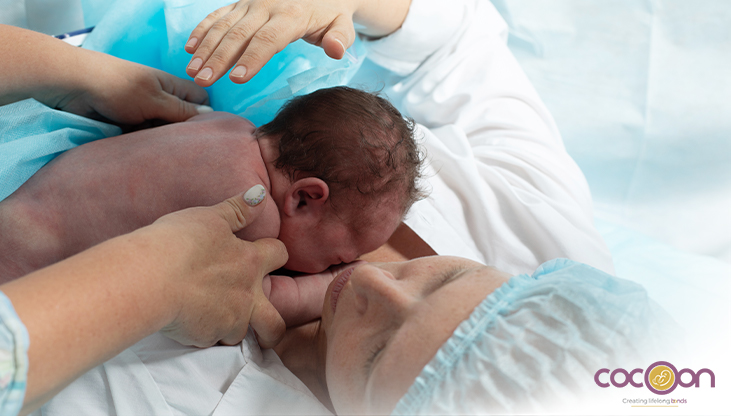Fear About Pregnancy Might Stem From Lack of Awareness.
Time-travel your mind to that exact same moment right before entering an exam hall. If you’ve prepared and studied well, chances are, you walk in confident, ready to solve all possible questions on the paper. But in case you haven’t, your heart might race almost like it would come out of your mouth, and your mind fills with worst-case scenarios of failing the subject.
The same thing could be applied during your pregnancy journey. Fear and anxiety often stem from a lack of awareness or believing in myths instead of facts. When you don’t comprehend what’s happening inside your body, every change appears alarming.
Thankfully, with the right knowledge and guidance from your gynecologist from Cocoon Hospital, you swap fear with calmness. Awareness offers you control, helping you make informed decisions with your doctor for yourself and your baby. So, read this blog as we walk through your trimester-by-trimester pregnancy health checklist, helping you stay confident, healthy, and prepared for every step of your journey.
Pregnancy Checklist by Trimester
“Pregnancy is a time of immense changes in your body that will feel abnormal but are completely normal.” - Portia Cohens, MD
Normally, pregnancy lasts about 40 weeks, counting from the 1st day of your last normal period. The weeks are categorized into 3 trimesters. Find out what the pregnancy health checklists are needed for each of these trimesters.
A. First Trimester (Week 1 to 12)
1. Changes Happening
- Hormonal fluctuations affect almost every organ system in your body, causing early symptoms such as nausea, fatigue, and missed periods to signal pregnancy.
- The baby is developing its important organs and spinal cord.
2. Checklist and Guidelines
- If your periods are missed, then confirm pregnancy by taking a home test. If positive, then schedule your 1st prenatal visit.
- Take your prescribed prenatal vitamins with folic acid. These help prevent the risk of neural tube defects.
- Say no to harmful substances like alcohol and smoking. Also, limit caffeine intake, as these interfere with fetal growth.
- Eat balanced, nutrient-rich meals like combinations of protein, fruits, vegetables, and iron sources.
- Keep yourself hydrated and engage in gentle exercise (if your doctor suggests), such as walking, to manage fatigue and support circulation.
- Go for your early screening tests (blood and ultrasound) to check for any chromosomal abnormalities.
- You can manage your common symptoms like nausea with the help of small, frequent meals and hydrating well.
- Avoid foods (spicy, fatty, and fried foods) that can trigger heartburn.
- Prioritize rest as much as possible. Remember, fatigue is common and normal.
B. Second Trimester (Week 13 to 28)
1. Changes Happening
- Pregnancy symptoms such as nausea may generally lessen; however, body shifts become more evident.
- Your abdomen becomes larger as the fetus develops bones, muscles, and senses. And you can begin feeling fetal movements.
2. Checklist and Guidelines
- You should continue going to regular prenatal visits for tracking the baby's growth and maternal health.
- Have a mid-pregnancy anatomy ultrasound around 18-20 weeks to assess the baby's development.
- Consume a healthy diet rich in calcium and iron. These help support the baby's bone growth and minimize maternal anemia.
- Engage in exercises that are safe during pregnancy (such as yoga and swimming). They help you with strength and good circulation.
- Keep your posture correct, stay hydrated, and eat fiber-rich foods. This helps manage common discomforts such as back pain and constipation.
- You can join childbirth classes and consider prenatal breastfeeding knowledge.
- You can contact a reliable hospital like Cocoon Hospital in Jaipur for luxury birthing. This helps provide you with personalized birth plans and compassionate support during delivery.
- Share your birth plan preferences with your doctor.
- Always avoid risky foods and substances, and avoid alcohol and smoking.
C. Third Trimester (Week 29 to Week 40 or Delivery)
1. Changes Happening
- By now the baby has gained most of its birth weight and is getting ready for a new life outside your womb.
- There can be increased pressure on your organs, which may cause shortness of breath and frequent peeing.
- You may experience cervical changes (just before labor, the cervix softens, shortens, and becomes thinner) and intermittent contractions. This means the body is preparing for labor.
- In the final stage of pregnancy, the cervix opens/widens as your body gets ready to deliver the baby.
2. Checklist and Guidelines
- Attend regular prenatal checkups for monitoring the baby's position, heartbeat, and mom's health.
- Understand and learn the signs of labor so that you can know when to contact your doctor.
- Pack your hospital bags beforehand and note down all birth plan details to avoid stress post delivery.
- Learn the relaxation and breathing methods for labor.
- Eat balanced meals to keep up energy.
- Cut down on excessive salt to reduce swelling.
- Rest as much as possible, sleeping on your side (especially the left) for better circulation to the uterus and baby.
- Arrange postpartum support and childcare if required.
- Prepare the nursery and purchase all the baby essentials (such as newborn diapers, wipes, and cream; bodysuits, socks, and mittens).
- Keep yourself hydrated and manage common symptoms like leg cramps or hemorrhoids by following medical advice.
When should I see my doctor when I'm pregnant?
If you have confirmed your pregnancy through a home kit. You should see your doctor to begin prenatal care.
After the 1st visit, the following is the typical schedule:
- Every 4 weeks during the first 28 weeks (about 7 months) of pregnancy.
- Every 2 weeks between 28 and 36 weeks.
- Every week from 36 weeks until delivery.
These visits are important to track your baby’s healthy growth and development. These help avoid any health risks or complications. Hence, do not miss them in any case.
Conclusion
The right knowledge about pregnancy is the real power; it means less fear and helps you understand the reasons behind the body's changes in pregnancy, thus giving you confidence.
Know the ‘what,’ ‘why,’ and ‘how to manage’ so that you can have full control and power over the things that are needed for a healthy pregnancy. If anything seems wrong, out of your knowledge, or symptoms that worry you, consult your doctor at Cocoon Hospital right away for support.
When to Consult Your Doctor
Consult right away in the following scenarios:
- Severe headaches, changes in vision.
- Sudden swelling, heavy bleeding, or severe abdominal cramping.
- Continuous vomiting.
- Any kind of infection.
- Unable to keep food down.
- High fever of 101°F or higher.
- Decreased or absent fetal movements in later pregnancy.
- Signs of labor before week 37.
- Painful contractions.
- Any unusual symptom that makes you worry.

















